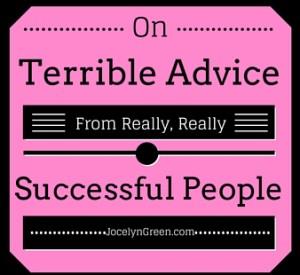
Recently I sat down with a really, really successful publishing editor who gave me some advice for my writing career. It was terrible advice. The worst ever. If I didn't already have ten books published and several national awards, I would have been crushed. As it was, however, I was just stunned. So stunned in fact, she cocked her head at me and said, "Are you OK?"
I wasn't, at the moment. What she had told me to do went against my entire purpose, and against my nature, and against my integrity. She told me in no uncertain terms that I needed to add a certain degree of smut to the book I'm writing right now so that it will make a lot of money. "That's where the money is," she said, "so that's where you want to go!" Did I mention this appointment took place at a Christian conference for Christian writers?
Maybe you, too, have been surprised by bad advice from someone you thought you could trust. It's jarring, isn't it?
This wasn't the first time I'd received terrible advice from a really successful person. A few years ago, I paid for a phone call with a bestselling author who sold her time to authors like me who wanted a little help brainstorming plots and characters. After I'd been sharing with her for a while, she stopped me and said this: "You keep talking about history. Your book is not about the history. It's about your story. Don't do so much research. I write my stories first and then check the research to make sure it fits." Well, dear reader, if you have read any of my novels, you know that my stories are, in fact, about the history. My stories are born from the history, my characters reflect the lives of people who really lived. Needless to say, though this author was helpful in other ways, that was one piece of advice I didn't take.
It can feel weird to disagree with someone who is really successful. It's easy to think that whatever they say must be true because it's worked for them. But if their words don't ring true in your spirit, if they don't resonate, forget it. My children's violin teacher taught them how to tell if their instruments are in tune with this concept of resonance. When you play a note that has the same name as one of the strings, after your bow leaves the string, the open string with the same note name should vibrate, or ring. That's resonance. This guy in the video clip explains it a little better:
You probably weren't able to hear the ringing through the video, but if you hear it live, it is so cool. I think the Holy Spirit works the same way with us. When we are in tune with Him--by spending consistent time in the Word and in prayer--if we hear something that resonates with us, we can feel good about that. But if it doesn't resonate with what we know to be true, we know it's not in line with what God wants for us. We hear a lot of voices in our culture, don't we? Some we invite to speak into our lives, like the examples I mentioned. Some are just constantly bombarding us--facebook, twitter, television, radio, even well-meaning people, be they strangers or otherwise. We need to train our ears to hear one voice over all the rest. Jesus said:
“I am the good shepherd; I know my sheep and my sheep know me— just as the Father knows me and I know the Father—and I lay down my life for the sheep. I have other sheep that are not of this sheep pen. I must bring them also. They too will listen to my voice, and there shall be one flock and one shepherd." ~John 10:14-16
We need to be listening for the voice of Christ in our lives. Very often, God uses people to speak truth into our circumstances (There is wisdom in the counsel of many, right?) but we need to be discerning as we sort through all the advice. In John 10:14, Jesus makes a point of saying that He and His sheep know each other. The worst advice I've received in life has been from people who don't know me at all. For example, the editor who told me sexualize my novel didn't know I'm a mother trying to raise my children to be modest, respectful and pure, and that I care deeply about not tempting my readers to impure thoughts. The bestselling author who told me to not care about the history so much was a contemporary romance novelist* who didn't know that our fascinating history is the very reason I write fiction in the first place. Thankfully, our Good Shepherd will never steer us wrong. What about you? Have you ever received advice that didn't resonate with you? Was it easy or difficult to decide whether to follow it? *I have nothing against contemporary romance novelists. Just saying we had different goals with our writing. :)


Comments
Add new comment